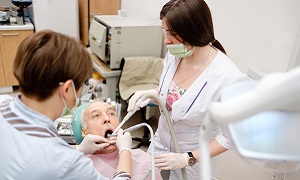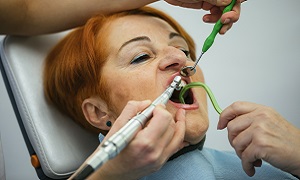Best Doctors in India for Root Canal Treatment
Best Hospitals in India for Root Canal Treatment
Hospital Highlights:
- Apollo Hospitals is a private healthcare group in India, with its headquarters based in Chennai. Established in 1983 by Dr. Prathap C. Reddy, the group offers a wide range of medical treatments and services across various specialties.
- It is renowned for emphasizing innovation and utilizing cutting-edge medical technologies into patient treatment.
- Known as India’s first corporate hospital, Apollo Hospitals is often credited for pioneering the private healthcare revolution in the country.
- With clinics and hospitals located all throughout India, Apollo Hospitals is a nationwide healthcare organization. Its presence can also be found in foreign countries.
- Preventive health examinations, medical and surgical treatment, and diagnostic centres are just a few of the services that the Apollo group provides.
- The group has several centres of expertise, including Cardiac Sciences, Neurosciences, Orthopedics, Emergency Care, Cancer Care, and Organ Transplantation.
- City: Chennai, India
Hospital Highlights:
- RIMC is a multi-specialty hospital in a sprawling area of 36 acres located in Chromepet, Chennai, Tamil Nadu, India.
- The facility has 450 beds including 130 critical care beds, 9 operating rooms, modern reference laboratories and radiology services, and is conveniently located near road, rail and air transportation.
- RIMC is led and managed by world-renowned physicians committed to healthcare.
- RIMC offers the broadest range of clinical care, education, and research. The hospital offers state-of-the-art technology and modern treatment facilities designed to provide health care at an affordable cost.
- Rela Institute is driven by patient needs, comfort and confidence.
- City: New Delhi, India
Hospital Highlights:
- Fortis Hospital in Shalimar Bagh is a multi-super specialty hospital that strives to provide world-class patient care by leaving no stone unturned.
- Fortis, Shalimar Bagh, with 262 beds and a 7.34-acre footprint, provides the best level of medical care through its team of doctors, nurses, technicians, and management professionals.
- City: Bengaluru, India
Hospital Highlights:
- Established in 2007, the Apollo Hospitals Bangalore is a 300-bed multispecialty hospital situated in Bannerghatta Road, Bangalore.
- Equipped with the state-of-the-art technology, it is a leading hospital dedicated to providing healthcare needs to patients with compassion and expertise.
- It is the first hospital to have completed the highest number of Robot Assisted Heart Surgeries in India.
- Over the years, it has successfully conducted some of the rarest medical procedures such as spinal angiolipoma excision, autologous chondrocyte implantations, and tibial tuberosity shift with MPSL reconstruction.
- The Apollo Hospitals Bangalore has the reputation of performing the greatest series of airway stents in the country.
- Additionally, the hospital is known for providing comprehensive treatment in specialties such as gastroenterology, urology, gynecology, oncology, colorectal surgery, etc.
- The “The Minimal Access Surgery Centre” (MASC), one of Apollo Hospitals, Bangalore’s premier Centres of Excellence, is devoted to the use of minimally invasive surgical procedures.
- In 2013, THE WEEK-A C Nielsen, Best Hospital Survey ranked Apollo Hospitals Bangalore as the 2nd best multi-speciality hospital in Bangalore.
- City: Mumbai, India
Hospital Highlights:
- Gleneagles Global Hospital The 450-bed facility comprises of 17-stories, housing state-of-the-art infrastructure, and advanced medical care facilities.
- The hospital offers end-to-end clinical, surgical, and diagnostic services. It is equipped with a team of eminent medical professionals aided by qualified nurses and medical staff
- The Hospital offers advanced Endoscopic procedures, Hepatobiliary and Liver Surgeries, Surgical and Medical Gastroenterology, Bariatric Surgery, and Robotic surgery.
- The hospital is a center of excellence for Orthopedics, Joint Replacement, Knee Replacement, and Hip Replacement surgery.
- City: Hyderabad, India
Hospital Highlights:
- CARE Hospitals were established in the year 2000, by CARE Group.
- The multispecialty hospital has 435 beds, including 120 critical care beds, with an annual inflow of 180000 outpatients and 16,000 in-patients.
- The hospital provides specialty medical services in Cardiology, Cardiothoracic Surgery, Pediatric Cardiology, Pediatric Cardiothoracic Surgery, Neurology, Neurosurgery, Nephrology, and Urology.
- The hospital has the first dual source, 128 slice CT scanner (for high precision cardiac imaging) – the first of its kind in south India.
- The hospital offers a wide range of accommodation facilities for the convenience of its varied patient base, ranging from general wards to super deluxe rooms.
- City: Mumbai, India
Hospital Highlights:
- Fortis Hospital in Mulund is a 315-bed multi-speciality tertiary care hospital with five JCI accreditations that offers a wide variety of diagnostic and treatment services. The Fortis Hospital in Mulund delivers patient-centred treatment with cutting-edge technology, highly skilled and experienced surgeons, and paramedical staff.
- This institution houses Maharashtra’s largest multi-organ transplant centre. It is also the first heart transplant centre in western India to conduct 100 or more consecutive heart transplants in under four years. It is the only hospital in the city to have multi-organ transplants and has handled the youngest patient for angioplasty. Fortis Hospital Mulund now boasts the first advanced surgical robot in central Mumbai.
- Cardiology and heart surgery, urology, nephrology, neurosciences, orthopaedics, digestive care, emergency and critical care, and maternity care are among the services provided by the hospital.
- City: New Delhi, India
Hospital Highlights:
- Manipal Hospitals, Dwarka, is a super-specialty hospital in Dwarka, New Delhi, which is a part of Manipal Hospitals Group.
- The hospital aims to provide the best treatment on par with international standards at a fraction of the cost.
- Equipped with 380 beds, the hospital is also one of the new age hospitals which are equipped fully with state-of-the-art infrastructure, cutting-edge technology as well as the latest and advanced clinical practices. The hospital also has 13 modular Operation theatres with 118 beds which are solely meant for critical care.
- The hospital comprises internationally acclaimed doctors and highly professional and experienced hospital and medical staff who are able to provide preventive, therapeutic, and diagnostic services all under one roof.
- City: Chennai, India
Hospital Highlights:
- Located in Chennai, India, MGM Healthcare is a top multispecialty hospital that provides all medical services under one roof.
- Since its founding in 2019, MGM Healthcare has quickly become a leading national referral centre, creating several innovative flagship initiatives.
- MGM Healthcare combines next-generation medical and digital technologies to provide better patient results.
- With 12 centres of excellence, more than 400 inpatient beds, 100 intensive care unit beds, and 24/7 emergency care, MGM Healthcare leaves no chance in redefining the patient experience in Chennai.
- MGM Healthcare boasts 250+ expert doctors across 30+ departments, including Cardiology, Pulmonology, Neurology, Obstetrics & Gynaecology, and more.
- They house 12 specialized Centres of Excellence, including Neurosciences, Orthopaedics, and Multi-Organ Transplantation.
- Their team of doctors, nurses, and paramedics works together to give every patient individualized treatment.
Hospital Highlights:
- Lilavati Hospital & Research Centre is India’s premier multi-speciality tertiary care hospital and has been recognised as a global medical excellence centre.
- Lilavati Hospital & Research Centre has built an unrivalled level of trust with its patients over the years, thanks to a solid foundation that comprises cutting-edge facilities, the best medical competence, research, education, and charity endeavours.
- The hospital is quite proud of the fact that it now serves patients from all kinds of backgrounds, not just from the United States but from all around the world.
- The hospital has a total of 323 beds, one of the largest Intensive Care Units (ICUs), 12 Operation Theatres with modern amenities, over 300 consultants, and almost 1,800 personnel.
Root Canal Treatment
Root canal, a treatment that is used for repairing and saving an infected tooth which has been badly damaged, rather than removing it. `Root canal’ is a term that comes from cleaning the canals inside the root of a tooth. Few decades ago, root canal treatments were painful procedures. But with advances in dentistry as well as local anesthetics, today people who go through this procedure, experience very little or no pain. There are however, alternatives to root canal treatment, which include extracting the damaged tooth, replacing it with a dental implant, bridge or a removal partial denture. A root canal is performed by a general dentist or an endodontist in the majority of cases, while the patient is under local anesthesia.
Why it is performed
A root canal is performed when the soft core in the tooth called the pulp, gets inflamed, injured or infected. The pulp has nerves, blood vessels as well as connective tissue. When a tooth gets cracked or has a deep cavity, bacteria can enter the pulp. If left untreated, bacteria and decaying material can lead to a serious infection or a tooth abscess, which will lead to pulp death or bone loss and even loss of the tooth itself. Symptoms include swelling around your face or neck, a hole in the tooth, gum swelling, toothache as well as temperature sensitivity. Your dentist will examine your painful tooth and the diagnosis will be confirmed through X-Rays.
Some of the causes that lead to the pulp getting damaged include:
- Untreated cavity leading to deep decay
- Dental procedures performed multiple times on the same tooth
- An injury to the tooth
- A crack or a chip in the tooth
Procedure
Step 1
A root canal is performed generally by a dentist. The dentist will first use numbing medication on your gum near the affected tooth and once it takes effect, he will inject a local anesthetic into the gums. Though this might cause a sharp pinch or a burning sensation, this won’t take much time to pass.
Step 2
After your tooth becomes numb, your dentist will create a small opening at the top of the tooth. After the infected or damaged pulp is exposed, the specialist will remove it using special tools, which are known as files. They will also be extra careful to clean out the pathways or canals in your tooth.
Step 3
Once the pulp is removed, the dentist can coat the area with a topical antibiotic for ensuring that the infection is gone and to prevent any further reinfection. After the canals are cleaned as well as disinfected, your dentist will seal the tooth with a sealer paste and rubber-like material called gutta-percha. They might prescribe oral antibiotics as well.
Step 4
The procedure will end after your dentist fills the small opening at the top of the tooth with a temporary material. This will prevent your saliva from causing damage to the canals.
Follow up
When the numbing medication wears off, your tooth and gums might feel sore. You might experience swelling in the gums as well. Many dentists usually treat these symptoms using over-the-counter pain medications, such as acetaminophen or ibuprofen. If your pain becomes extreme or if it lasts for multiple days, then you need to contact your dentist
You might be able to resume your normal just the day after the procedure is performed. Try not to chew with the damaged tooth, until it has been filled permanently or a crown isn’t placed over the top.
After some days, you can see your dentist again and they’ll take X-rays and make sure that the infection is no more. If you prefer, you can also let your dentist place a permanent crown on your tooth. Crowns are artificial teeth made of porcelain or gold. Be noted that it might take you weeks to get used to how your tooth feels after your procedure.
Risks
Though a root canal is performed to save your tooth, sometimes however, the damage is too deep in order to withdraw the procedure. This can eventually result in you losing your tooth.
There is another risk, which involves developing an abscess at the root of your tooth. This can happen when some of the infected materials remain behind or if the antibiotics are ineffective.
If you’re unsure regarding a root canal, talk to your dentist regarding an extraction. This will involve placing a partial denture, implant or bridge in the place of the damaged tooth.














